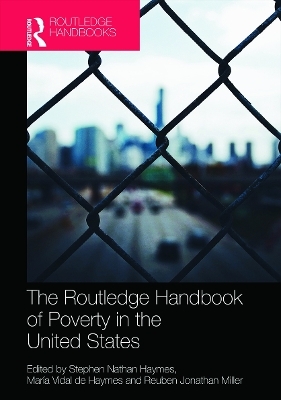
The Routledge Handbook of Poverty in the United States
Routledge (Verlag)
978-0-415-67344-0 (ISBN)
In the United States, the causes and even the meanings of poverty are disconnected from the causes and meanings of global poverty. The Routledge Handbook of Poverty in the United States provides an authoritative overview of the relationship of poverty with the rise of neoliberal capitalism in the context of globalization.
Reorienting its national economy towards a global logic, US domestic policies have promoted a market-based strategy of economic development and growth as the obvious solution to alleviating poverty, affecting approaches to the problem discursively, politically, economically, culturally and experientially. However, the handbook explores how rather than alleviating poverty, it has instead exacerbated poverty and pre-existing inequalities – privatizing the services of social welfare and educational institutions, transforming the state from a benevolent to a punitive state, and criminalizing poor women, racial and ethnic minorities, and immigrants.
Key issues examined by the international selection of leading scholars in this volume include: income distribution, employment, health, hunger, housing and urbanization. With parts focusing on the lived experience of the poor, social justice and human rights frameworks – as opposed to welfare rights models – and the role of helping professions such as social work, health and education, this comprehensive handbook is a vital reference for anyone working with those in poverty, whether directly or at a macro level.
Stephen Nathan Haymes , Ph.D., is Associate Professor in the College of Education and an affiliated faculty member of the Department of Peace, Justice and Conflict Studies and the Department of International Studies at DePaul University, Chicago. Professor Haymes’ areas of research interest are Africana Philosophy, postcolonial theory, forced migration, and education, conflict and development. Currently, he is working on a project related to place-based education and eco-justice with displaced Afrodescendent communities and a Colombian Human Rights NGO. He serves as the co-editor of The Journal of Poverty: Innovations on Social, Political and Economic Inequalities, aquarterly peer review publication of the Taylor and Francis Group. María Vidal de Haymes , Ph.D., is a Professor in the School of Social Work and Director of the Institute for Migration and International Social Work at Loyola University Chicago. She is co-editor of the The Journal of Poverty: Innovations on Social, Political and Economic Inequalities. She teaches courses in areas of social welfare policy and migration studies and her research addresses the economic and political incorporation of Latino immigrants in the United States; the impact of migration on family relationships, roles, and functioning; forced migration; the role of faith-based organizations in the pastoral and social accompaniment of migrants; child welfare; and social work education.Reuben Jonathan Miller, Ph.D., is an Assistant Professor of Social Work at the University of Michigan. His research, writing, and advocacy work focus on the well-being of former prisoners living in large urban settings and the ways in which criminal justice and social welfare policy are daily experienced by urban poor populations.
General Introduction. Section I. From the Production of Inequality to the Production of Destitution: The U.S. Political Economy of Poverty in the Era of Globalization Section I Introduction. Chapter 1. Beyond Coincidence: How Neo-Liberal Policy Initiatives in the IMF and World Bank Affected US Poverty Levels Chapter 2. The Discursive Axis of Neoliberalism: Debt, Deficits, and Austerity Chapter 3. Deindustrialized Small Cities and Poverty: The View From Camden Chapter 4. Transnational Factors Driving US Inequality and Poverty Chapter 5. Globalization and the Trends in Inequality of Poverty in the US in the Last Decade Chapter 6. The House Always Wins: How State Lotteries Displace American Tax Burdens by Class and Race Chapter 7. Predatory Financial Services: The High Cost of Being Poor in America Chapter 8. Consumer Credits as a Quasi Welfare System for Failed Neoliberals’ Trickle-Down Policies Between the 1980s and 2000s Section II. Discourses of Poverty: From the 'Culture of Poverty' to 'Surplus Population' Section II Introduction. Chapter 9. The Problematic Conceptualizations and Constructions of Poverty: Select Global Analysis Chapter 10. Neoliberal Economics and Undergraduate Poverty Education Chapter 11. The Importance of Context to the Social Processes Around Material Hardship Chapter 12. Welfare Dependency and Poverty: Neoliberal Rhetoric or Evidence-Informed Choice? Chapter 13. Babies as Barriers: Welfare Policy Discourse in an Era of Neoliberalism Chapter 14. We are the 99 Percent: The Rise of Poverty and Decline of Poverty Stigma Section III. From the Welfare State To The Neoliberal State: From Regulating to Imprisoning the Poor Part I. Transformation of the Welfare State: Education Section III Part I Introduction. Chapter 15. Neoliberalism and African Americans in Higher Education Chapter 16. How Neoliberalism Subverts Equality and Perpetuates Poverty in our Nation’s Schools Chapter 17. Invisible Students and the Issues of Online Education Chapter 18. Poverty Reduction Through Education: An Analytical Framework for Cash Transfers for Education Chapter 19. Students that Lag or a System that Fails?: A Contemporary Look at the Academic Trajectory of Latino Students Chapter 20. The New Two Tiered Education System in the United States: Expanding and Commodifying Poverty and Inequality Part II. Transformation of the Welfare State: Cash Transfer, Housing, Nutrition, and Health Section III Part II Introduction. Chapter 21. Neoliberal Globalization: Social Welfare Policy and Institutions Chapter 22. The Personal Responsibility and Work Opportunity Reconciliation Act of 1996 (PRWORA) Chapter 23. Anti-Poverty Policies and the Structure of Inequality Chapter 24. Mixed-Income Communities and Poverty Amelioration Chapter 25. Countering Urban Poverty Concentration in the United States: The People versus Place Debate in Housing Policy Chapter 26. Privatizing the Housing Safety Net: Hope VI and the Transformation of Public Housing in the U.S. Chapter 27. Poverty De-Concentration Priorities in Low-Income Housing Tax Credit Allocation Policy: A Content Analysis of Qualified Allocation Plans Chapter 28. Neo-Liberalism and Private Emergency Food Networks Chapter 29. Examining Food Insecurity Among Children in the SNAP Households: Implications for Human Rights Chapter 30. The Influence of a Neoliberal World View on Health Care Policy Part III. Transformation of the Welfare State: Criminalizing the Poor Section III Part III Introduction. Chapter 31. Managing the Neoliberal City: ‘Quality of Life’ Policing in the 21st Century Chapter 32. The Rise of Incarceration Among the Poor with Mental Illnesses: How Neoliberal Policies Contribute Chapter 33. Class, Crime and Social Control in the Contemporary United States Chapter 34. A People’s History of Legal Aid: A Brief Sketch Chapter 35. Surviving Gender-Based Violence in the Neoliberal Era: The Role of the State in Transforming Poor Women from Victims to Survivors Chapter 36. Systematic and Symbolic Violence as Virtue: The Carceral Punishment of African American Girls Chapter 37. The Paradox of Entrepreneurship as a Policy Tool for Economic Inclusion in Neoliberal Policy Environments Section IV: Global Poverty and the Lived Experiences of Poor Communities in the United States Section IV Introduction. Chapter 38. Social Ties Among the Poor in a Neoliberal Capitalist Society Chapter 39. Paths into Homelessness: An Examination of Structural Factors Chapter 40. Examining Racial-Ethnic and Gender Disparities in Poverty Among the Elderly Chapter 41. Ableism, Poverty and the Under-Celebrated Resistance Chapter 42. Breaking the Silence: Homelessness and Race Chapter 43. The Effects of Neoliberal Capitalism on Immigration and Poverty Among Mexican Immigrants in the U.S. Chapter 44. The Neoliberal Diet: Fattening Profits and People Chapter 45. Grounding Grandma: A Qualitative Discussion of Home Maintenance Policies for Aging in Community Chapter 46. Poverty, Health and Asian Non-Linearity Section V: Organizing to Resist Neoliberal Policies and Poverty: Activism and Advocacy Section V Introduction. Chapter 47. The Poverty of ‘Poverty’: Re-Mapping Conceptual Terrain in Education and Counseling Beyond a Focus on Economic Output Chapter 48. Legitimizing and Resisting Neoliberalism in US Community Development: The Influential Role of Community Development Intermediaries Chapter 49. Too Legit to Quit: Gaining Legitimacy Through Human Rights Organizing Chapter 50. Neoliberalism, State Projects, and Migrant Organizing Chapter 51. From the Self to the Social: Engaging Urban Youth in Strategies for Change Chapter 52. Migrant Civil Society: Shaping Community and Citizenship in a Time of Neoliberal Reforms Section VI: Reframing Poverty in the Era of Globalization: Alternatives to a Neoliberal Economic Order Section VI Introduction. Chapter 53. Creating a Sustainable Society: Human Rights in the US Welfare State Chapter 54. Returning to the Collective: New Approaches to Alleviating Poverty Chapter 55. Why We Cannot All be Middle Class in America
| Erscheint lt. Verlag | 16.12.2014 |
|---|---|
| Zusatzinfo | 41 Tables, black and white; 17 Line drawings, black and white |
| Verlagsort | London |
| Sprache | englisch |
| Maße | 174 x 246 mm |
| Gewicht | 1224 g |
| Themenwelt | Sachbuch/Ratgeber ► Gesundheit / Leben / Psychologie |
| Sozialwissenschaften ► Pädagogik ► Bildungstheorie | |
| Sozialwissenschaften ► Politik / Verwaltung ► Staat / Verwaltung | |
| Sozialwissenschaften ► Soziologie | |
| Wirtschaft ► Volkswirtschaftslehre ► Wirtschaftspolitik | |
| ISBN-10 | 0-415-67344-5 / 0415673445 |
| ISBN-13 | 978-0-415-67344-0 / 9780415673440 |
| Zustand | Neuware |
| Haben Sie eine Frage zum Produkt? |
aus dem Bereich


